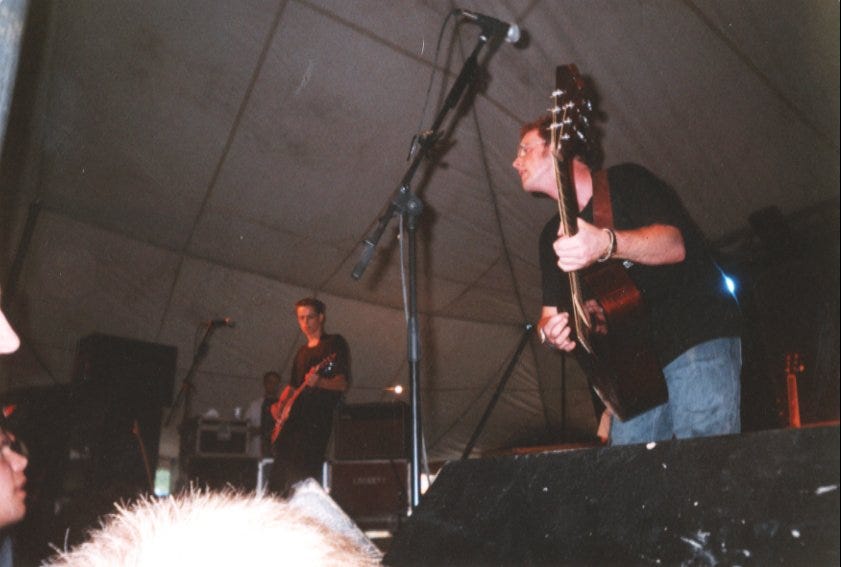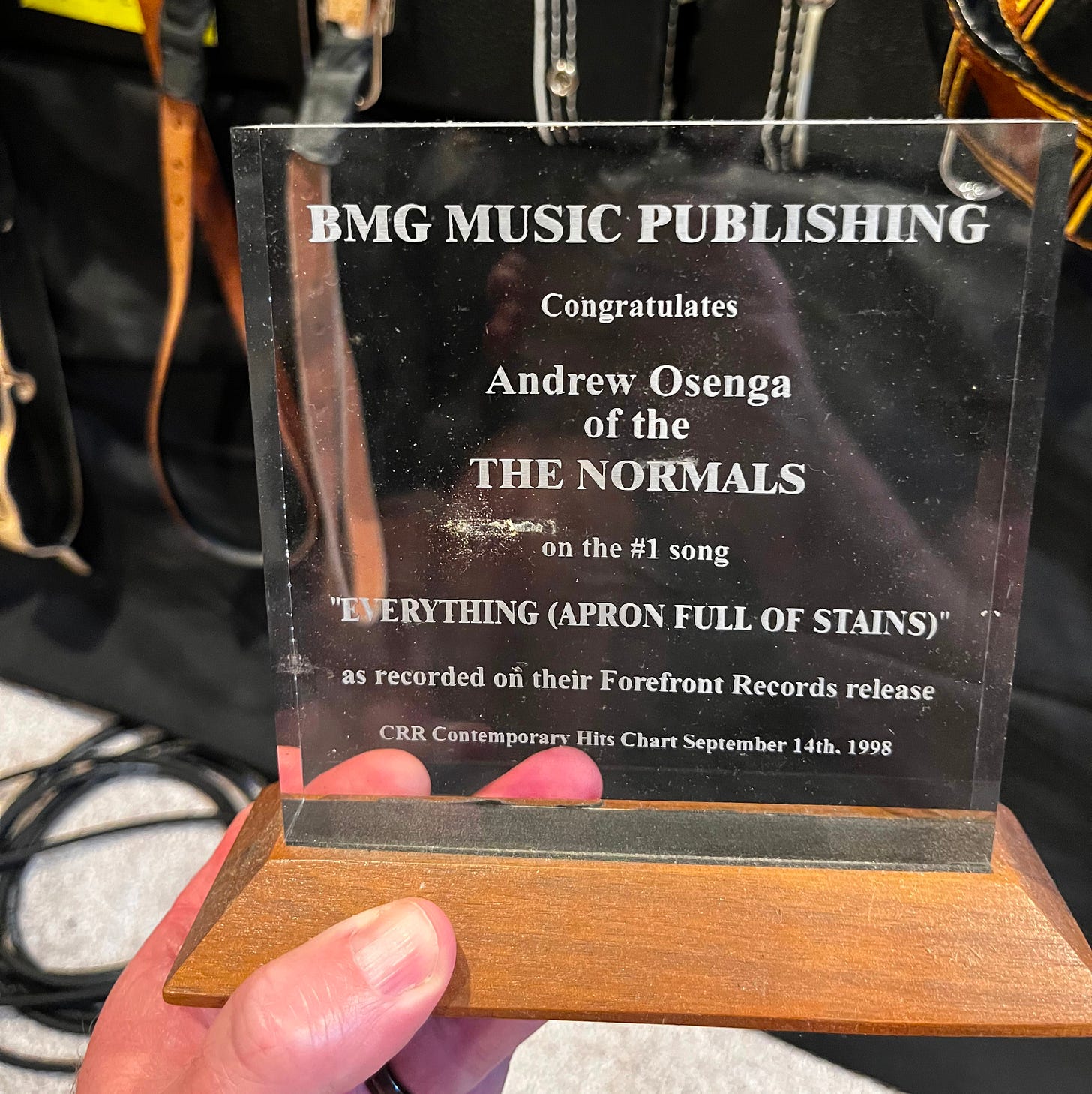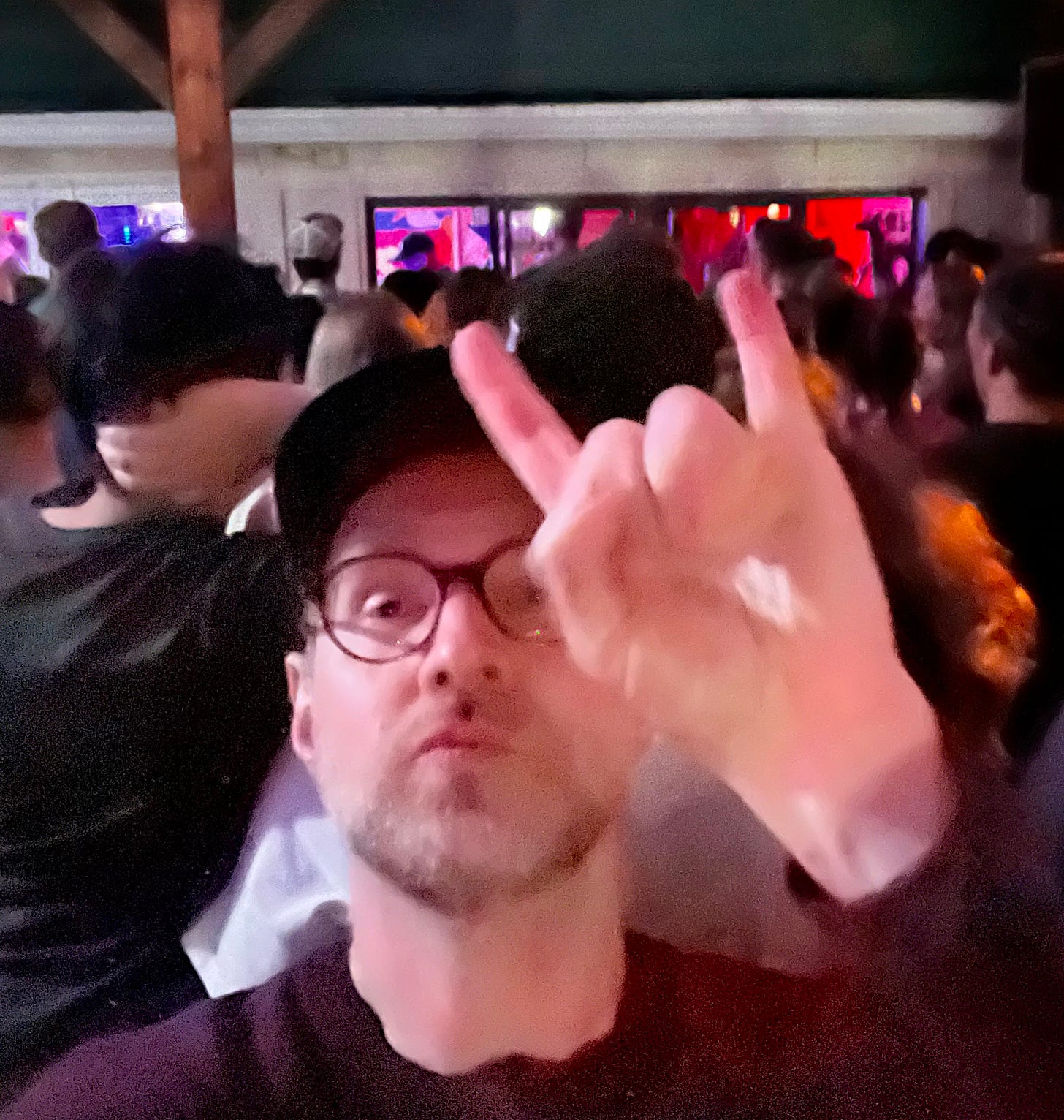I was 19 the day I signed my first record deal, in 1998.
I had maybe played 15 shows in my life and, clearly, all my hard work had finally paid off.
Our band, The Normals, was quickly welcomed into a community of misfit toys. While everybody else our age was going to college, we joined a small traveling circus of 15-passenger vans rolling from town to town, showing up each weekend at churches and colleges across every denomination.
The best were the festivals - like Ichthus and Soulfest and AtlantaFest and LiFest (the most alive one, obviously) and the Creations, both East and West - because everybody would be there at the same time, just hanging out, watching each other’s sets, and becoming buds.

That became the first circle of friends I made as a musician. Over the years, I would make more, as those bands all grew up or broke up, and touring moved from vans to tour buses. The circle expanded, too, as my career grew into the studios and the writing rooms and eventually the record companies.
Relient K got back together a couple weeks ago and played two unannounced shows at a little breakfast and burger joint here in Nashville. It was a friends-and-family kind of thing that quickly spilled out onto the bigger porch the place just added a few years ago.
This sort of idealized Nashville moment rarely happens, despite what Instagram suggests, but that night I drove nine minutes from my house, parked in the Kroger across the street, and walked in during the third song and immediately started giving hugs and fist bumps to friends across all those different eras of friendship.
Alison had asked me as I was walking out the door if I was going with anybody, and I said, “Nah, I’m sure I’ll find some friends there.”
And I did. A ton.
For a kid who talked to maybe four people total in 7th grade, I can’t tell you how sweet that is and how much I do not take that for granted now.
I love this city and so many people in it.
That’s why the Michael Tait stuff hits so heavy. I didn’t know him at all (even though we were actually labelmates 20-some years ago), but we shared this town and these are my people, and…
sigh
The questions that keep popping up after something like this are:
“Can we trust any Christian artists?”
“How could someone sing about one life and live a completely different one?”
“How did the people around them not know this was happening?”
All these questions are absolutely and completely valid.
Without excusing one tiny fraction of an inch of Michael’s behavior, (or Sean Feucht’s or Carl Lentz’s or whoever’s) this whole thing has had me thinking back to when I started out, and all that happens (or doesn’t happen) at the beginning of a young artist’s career.
It’s so easy to forget, when we see artists on instagram or album covers, just how young they often are - how young I was - and that they are very much still in formation as an artist, a Christian, and a person.
I signed my first song publishing deal when I was 17. Still in high school. My first meetings with record labels started shortly after. The first two years of my music career felt very much like the movie That Thing You Do, where a man in a really nice van put my song on the radio and changed the course of my life.
I could use a phrase here like “before I even understood what was happening,” but the truth is, though I didn’t understand it nothing would have stopped me. I wanted to make music for a living, this was my shot, and I took it.
I don’t regret it, AND YET…
I was 19 the day I signed my first record deal.
I have daughters now who are 20 and 18. They are miles more mature than I was back then. They’re girls, so obviously. I can’t imagine them doing what I was at that age: Giving interviews to magazines, talking in front of large crowds, and being asked to write more songs to be put in front of more people—all of which I wanted to do—none of which I was mature enough to do.
I was still 19 when I had a #1 hit on Christian radio. For a week there we actually knocked dc Talk off the throne to get that spot. It was short-lived and, in the world of Christian radio, we would become a one-hit wonder, but I have a little plaque that says “Congratulations to the THE Normals on their #1 hit…” Made all the more precious for the typo.
19 years old. You know what is happening to 19-year-olds?
They are college sophomores, and now that they’ve learned how to live on their own a little bit, they’re starting to look up and notice that the world is SO much bigger than they ever realized.
They’re learning about other ways of seeing the world—about their faith, their politics, their money, their self-assessment, you name it…—and very often, they have to take a wandering path so that when they come back home (if they do) it’s because they wanted to.
They’ve got to get far enough away to see their beliefs, their family, their friends, and even themselves, as something they choose rather than has been chosen for them.
It’s natural, sometimes painful, and absolutely necessary.
So what happens when some version of Tom Hanks puts what you thought during one night of that journey on the radio and people really like it? When now you have to sing it every night but you just read a new book and it changed your mind about everything in that song and now you don’t know WHAT you think?
What space does this leave for you to “work out your salvation with fear and trembling”?
Asking some of these new questions, or even writing different kinds of songs, well… they could threaten the career that you and your friends and your family and all the grown-ups around you are now all counting on. And you just started this career that you’ve really, really wanted because you love to write songs and play music with your friends and you know God gave you a gift for it.
What are you supposed to do?
Well, you have to build a double life.
That’s your answer.
The machine is built to split people in two.
It happened to me. Took me years to put the pieces back together.
Happened to a lot of my friends, too.
They’ve had to have “pure hearts of worship” in front of thousands of people night after night - when some nights life back home was breaking that heart in two, or the promoter of the event wasn’t playing fair, or they themselves were walking onstage knowing they’d just messed up again - but the evening called for celebration or intimacy, and not the repentance they needed.
In moments like that the line between professionalism and hypocrisy starts to get a little blurry.
A lot of my friends have also reassembled, and in a myriad of beautiful ways. But many have walked away from the faith completely—and when you hear some of their stories, it’s sadly not that hard to understand why.
Michael Tait was 23 when the first dc Talk album came out. So a couple years older than me, but they would have made that record when they were college age, in that formative time. And that album was huge.
He had to make some choices about what to do when what was working out there on the stage wasn’t the questions he was asking inside. Sadly, he made some of the worst choices possible.
But I tell you what, I made some bad choices, too.
I got bitter. So bitter. When that machine moved on to the next big thing and we weren’t it, I picked a couple people to blame, and I gave it everything I had. At some point, there wasn’t enough energy to write great songs and also be mad so I just stayed mad.
It was a great decision and it totally worked.
🙄
I was a new husband at the time, and with all that bitterness I wasn’t a very good one. I had opportunities with my new band, Caedmon’s Call, and a few things happening as a songwriter and solo artist, but the chip on my shoulder was often so big it kept me from walking through the open doors.
It turns out people don’t love it when you talk about them behind their back, and putting down everybody who’s doing better than you doesn’t make you look as cool as you think it does.
Deeper than all that, I didn’t know what I believed anymore.
I knew that some of what I’d been taught as a kid was still really beautiful to me, but other parts of it had been pretty harsh and judgmental. It would take me years to separate the two, and in the interim I didn’t know how to celebrate the one and move past the other without just thrashing and trashing them both in the process.
The added conflict of “positive and encouraging” product vs thoughtful Christian art required a lot more nuance to handle than I was capable of. I just wanted to turn every table in sight, and I often tried. Again, this makes one VERY fun to be around.
Part of the reason I jumped at the chance to join Caedmon’s was that I didn’t have to be in the middle anymore. I didn’t have to introduce songs or talk in interviews. I could just play my guitar and sing harmonies to songs somebody else had already written.
In retrospect, that was a lifeboat God let me float in for a little while. Caedmon’s and the Behold the Lamb crew were a safe place to heal and rest - and, yes, be an absolute butthead - around some people who loved me and cared for me anyway.
I’m going to stop talking about Michael Tait, because I don’t know him and I shouldn’t try to armchair-diagnose him, besides this: Lord, have mercy.
I’m not throwing CCM under the bus either, though there were days I wanted to back in my 20s.
No, it was so fun to walk into that show the other night and see my CCM friends from a bunch of different circles and know that I belonged.
As much as it can drive me crazy at times…
These are my people. This is my place.
And yet, the machine that brought us together is still built to split people in two.
So what do we do with that?
More soon…




Thank you for this post. As a pastor, it’s one struggle I have with everything we do being shared and archived forever on the internet. Every sermon is an attempt to proclaim good news in a way that resonates with our local congregation. Sermons (and our worship gatherings) are a moment of our life together that, because of streaming, becomes “content” for anyone anywhere to consume and critique… apart from context or community. I think the challenge is even greater as an author and songrwriter because we have to intentionally “market” the snapshots of life that become our public work outside of a local comunity. An idea, feeling, theology, story, etc. that becomes a song or story, may be authentic in the moment, but our lives, stories, ideas, and theologies evolve over time, and the relationships our “audience” has with us is filtered through the lens of that work. Life happens and experiences shape us, but some people resonate with us only in the moment share in that public work. Thank you again for this post! I always look forward to reading what you write. Also… your vinyl is one of my favorite spins and is oten on my turntable.
This perspective is gold, Andrew. And while those responsible for abuse must be held accountable, there is certainly a deeper mechanism at work than just the "moral failings" of a few individuals, like you've pointed out here. At the risk of sounding completely naive, one question I have (and one that I'm sure doesn't have a simple, tidy answer) is: what's keeping CCM audiences from going on the journey with these young artists? By nature of being human, many if not most listeners of Christian radio go through similar existential struggles and crises of faith as these young artists who are stifled by the CCM industry in expressing the real emotional details of their faith journeys. So why not go together? Why is it so taboo to be truthful about your experience as a Christian artist? (I imagine the answer starts somewhere between the focal points of shame, profit, and inertia...but I'd really like to know what you think)